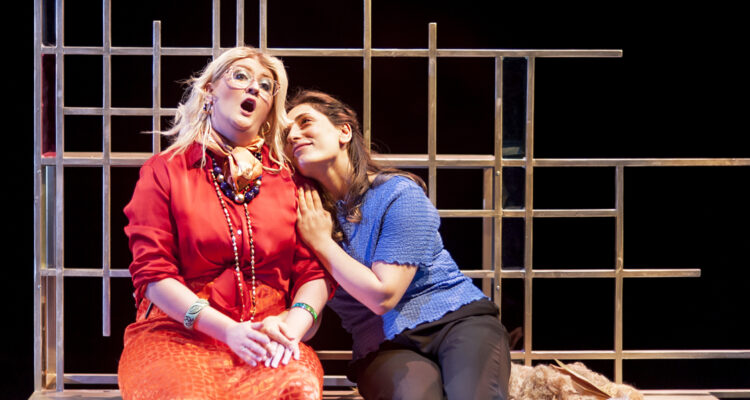Eugene Onegin is a very Russian opera. Premiered in Moscow in March 1879, it is set first in a remote country estate where nothing ever happens and then in opulent mansions in St Petersburg where aristocratic intrigue is rife. In this imaginative version directed by Eleanor Burke for the admirable Hampstead Garden Opera (HGO) the setting is shifted to the present day and the contrast between country simplicity and city sophistication is shown in a different but effective way. And the central themes – of unrequited love and how time and experience can change people – are boldly tackled.
The story is of the supercilious, easily-bored Eugene Onegin and the innocent novel-reading Tatyana Larina. They meet at her family’s remote country estate. She impetuously declares her love for Onegin but he coldly rejects her – “Try to practice self-control” he sings. After a pointless duel in which his best friend Lensky is killed, he wanders the world. When he returns to Petersburg six years later, still bored, he finds Tatyana has married his much older cousin, Prince Gremin. Onegin finds he now desires her but, despite his pleading (and Tatyana’s reluctantly admitted love for him), she will not betray her marriage vows. The opera ends with Onegin in despair.
As always, HGO has found a group of young singers who clearly relish their chance to sing key roles in a fully staged production – there are two casts that sing at alternating performances. On the night I saw the production, Onegin was sung by Ambrose Connolly and Tatyana was sung by Nicola Said. Both were excellent. Connolly has a rich and mature baritone voice that in the first act conjures up that particular hint of world-weary cynicism that captivates Tatyana, Said was in equally fine voice and more than managed the testing “letter song” in the first act – and the transition from country girl to Princess Gremina in the second. As Lensky, Martins Smaukstellis was superb. Even though the production allowed him little room to establish the ‘poetic soul’ that has entranced Olga, in the famous aria before the duel he found the tone and the dramatic depth needed – and his duet with Onegin at that point was unexpectedly moving. As Olga, Katey Rylands did not have quite the voice I would have chosen for the role – but she was a lively presence, and a fitting foil for Lensky’s jealousy. Wonsick Oh was not the grizzled warrior described in the libretto but his resonant bass was spot on. The small orchestra under the baton of Oliver Cope was a little tentative in the opening bars but soon found Tchaikovsky’s musical mood.
Eleanor Burke’s production was full of good ideas. Tatyana wrote her letter to Onegin on the fly leaf of the book he had given her earlier – Pushkin’s poems, maybe? And the way that the duel ended made a great deal of sense. However, it was at that point that the updating to the present day showed the cracks – what is a formal duel with guns doing in a modern day scenario? But the tormented duet between Tatyana and Onegin at the climax of the opera was all one could have wanted, The brief moment when they sing “happiness was so close” was marvellous and so the production ends on a high. Another real achievement for Hampstead Garden Opera and its young performers.
Composer: Pyotr Tchaikovsky
Libretto: Tchaikovsky (after Pushkin)
Director: Eleanor Burke
Conductor: Oliver Cope
Performers incl: Ambrose Connolly, Nicola Said, Martins Smaukstellis, Katey Rylands
Running time: 2 hours 45 minutes
Dates: until 17 November 2024
Photograph credit: Laurent Compagnon

